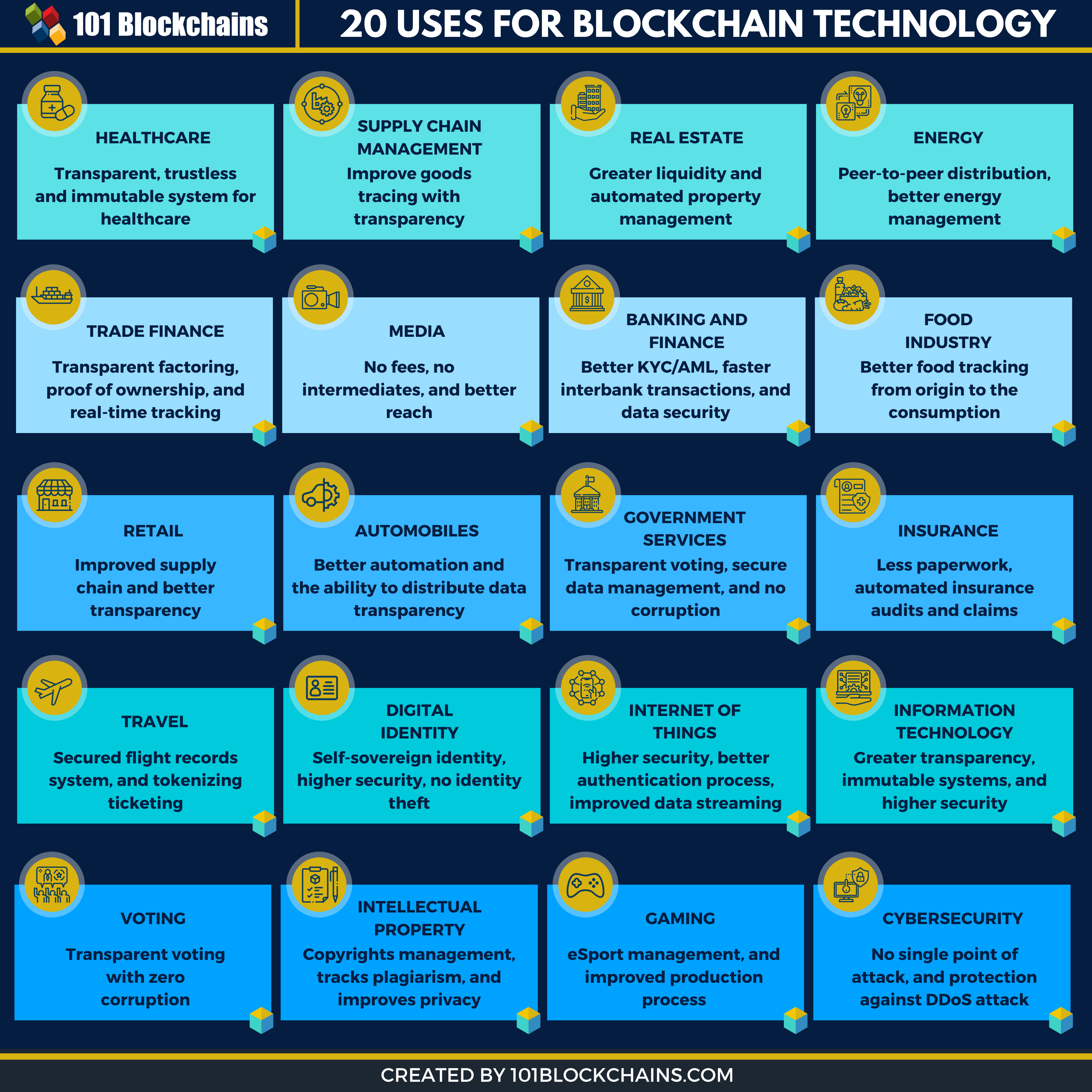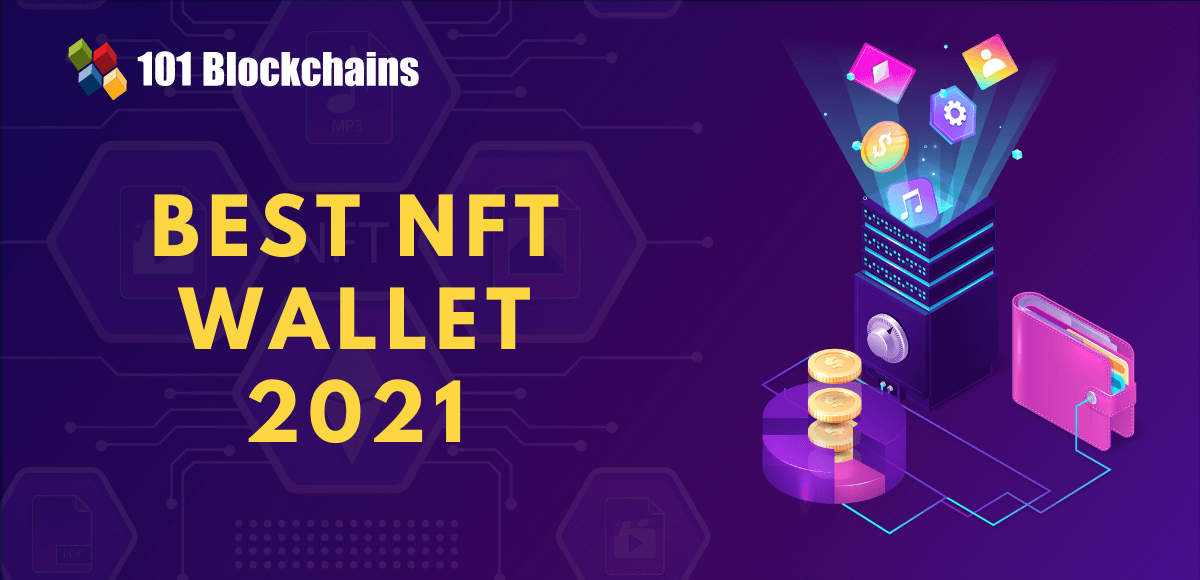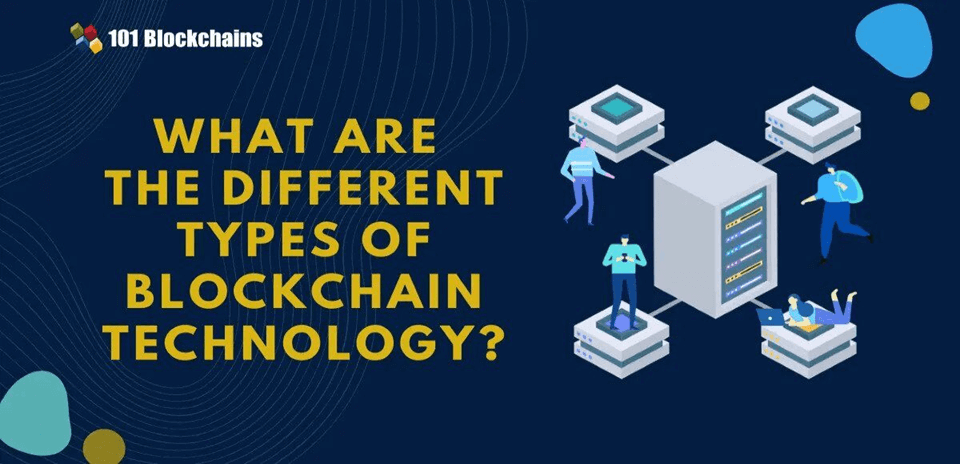Learn how blockchain truly works, master key definitions, and uncover what makes smart contracts so "smart." Dive into the fundamentals, gain valuable insights, and start your blockchain journey today!

- Reviews
101 Blockchains
- on August 09, 2020
20+ Uses For Blockchain Technology That You Should Know
Learning the uses for blockchain technology can give you a clear understanding of how it can change the world around us. If you are new to blockchain and want to learn the in and out of blockchain technology, then learning the uses of blockchain technology can really help!
There is no one denying the impact of blockchain technology in our real world. Even experienced blockchain users can benefit by learning the uses-cases for blockchain technology. And, what about enterprises? Well, we got everyone covered as we will go through uses for blockchain technology from the business and enterprise perspective.
Apart from that, we will also cover real world uses for blockchain technology that is aimed at people who are not from a technical background. Overall, this post will be a complete guide for learning about the use cases for blockchain technology.
But before we do so, we need to learn about Blockchain technology. Let’s get started.
Build your identity as a certified blockchain expert with 101 Blockchains’ Blockchain Certifications designed to provide enhanced career prospects.
Blockchain Technology: A New Way To See The World
Our world is centralized. If you look around yourself, you will find tons of services that use centralization to power their whole process. The bank that you visit to deposit or exchange money is centralized and they hold the ownership of your assets in more ways than you can think of.
Blockchain technology is here to break the shackles of centralization and provide better options to the end-users. At the core, blockchain is a decentralized, peer-to-peer ledger-based network where there is no central authority.
The core idea of decentralization is what makes blockchain technology so popular. It is now being used in different sectors to improve their state.
To ensure decentralization, the network deploys some key things to make the decentralization work.
- Each peer takes part in maintaining the network. Each peer also has a full ledger copy.
- The network also utilizes a consensus method that validates transactions.
- Mining mechanism is also provided to peers where they need to participate in the consensus method by following the rules of mining.
20+ Uses For Blockchain Technology That You Should Know
Now that we have understood the basics of blockchain technology, we can now shift our focus on the blockchain technology use cases.
First, we will take a look at the uses for blockchain technology from a business perspective.
Business Uses For Blockchain Technology
Businesses have different needs. They need technology that can be efficient, progressive, and help them solve the pain points related to previous technologies.
Blockchain provides that scope of improvement for businesses and it can already be seen in the current market. Sectors like finance, healthcare, real estate, energy, media, and others are moving toward blockchain adoption slowly and shortly.
Let’s look at some of the business use cases for blockchain technology.
-
Healthcare
We are currently in the middle of a pandemic. And, if you look at the data, our healthcare systems are not prepared for something big like this. In some countries, there has been a huge demand for beds and there is no way to learn where beds are available. This is because of the centralized healthcare system that we are using for the last three to four decades.
A centralized approach means that there is no proper way of communication between the hospitals on sharing critical information on beds, medicine, or patient profile. Another problem that the current centralized systems are the lack of tracking the medicines. This leads to higher prices for medicines that are black-marketed by the hospitals itself. In short, there is a lack of transparency in the whole system.
Blockchain changes all of these. It provides a transparent, trustless, and immutable system that can change how healthcare can tackle problems. For instance, the medicines can be tracked by integrating it into the supply chain. Also, by using a connected blockchain network, every player can share critical information with each other. The patients can also trust the system more and understand how the system works.
One notable player in healthcare that is changing the landscape by using blockchain technology is BurstIQ. It is a security platform that enables companies to securely transfer patient’s data from one place to another. They also follow strict HIPAA compliance rules.
We have covered Blockchain For Healthcare where you can find all the interesting use cases and applications.
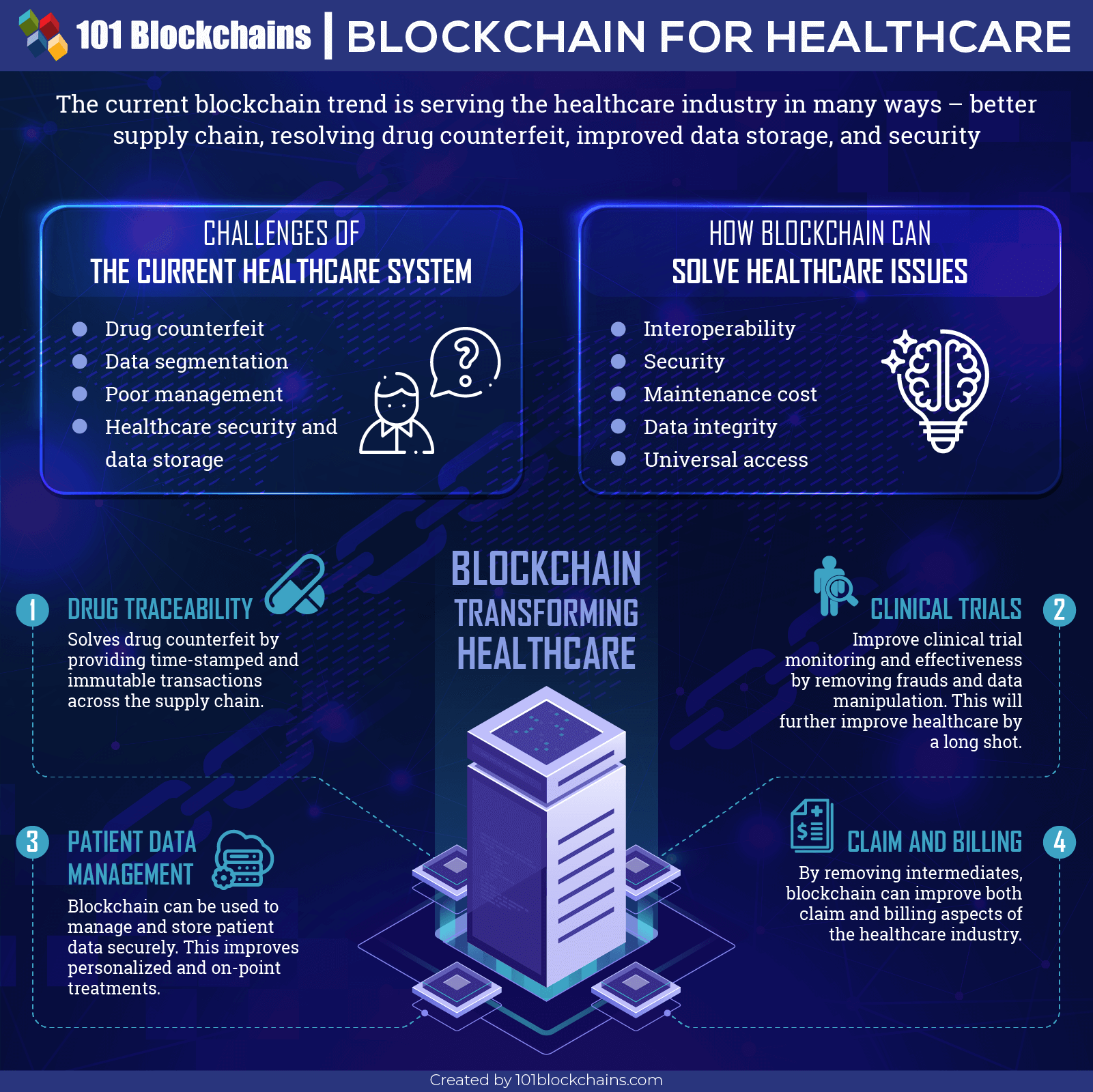
-
Supply Chain Management
There is no doubt that the core backbone for any business out there is supply chain management. Be it retail or eCommerce, having an optimal supply chain can make or break a business.
Even though businesses are working impressively with the current supply chain management systems, there are still some major drawbacks that don’t let it operate at maximum optimal performance.
The current pain point for supply chain management is traceability. Blockchain technology provides transparency to the whole supply chain process. It gives businesses the ability to track the goods from the source points to their delivery points. These trackings are done accurately and provide a better way to handle goods and their condition.
The food industry can utilize the radical change provided by blockchain technology. IBM Food Trust is one of the prime examples when it comes to tracking food. They are tracking food from their origin to their consumption, benefitting almost everyone in the process including retailers, manufacturers, suppliers, and the end-user. It works by tagging each food item with a unique barcode that is generated by the blockchain. It is then tracked throughout its life cycle. So, if something goes wrong, the system will be notified about it and the appropriate steps will be taken to resolve it.
Want to learn about the blockchain in supply chain? Enroll Now in Enterprise Blockchains and Supply Chain Management Course

-
Real Estate
Real Estate is a big industry, and the numbers speak for themselves. In the US alone, the real estate business is booming at around 6-7% each year with the average median price for houses around $300K. The number might give you the impression that real estate is working as promised and is not suffering from any problems. That’s completely wrong!
Real estate might be overall a very profitable market. However, it is not as optimal or profitable as it should be — with the right technology.
The current pain points of real estate is lack of transparency, intermediaries, long process, and fraud. So, what does all of these mean?
Example
If you decide to buy a house in 2020, you need to go through a step or process that can be time-consuming and costly. In the initial stages, you need to check if the property that you have decided to buy is legally sold by its real owner or not. To verify that, you need to hire a lawyer to verify the papers. On top of that, the paper can be faked to deceive the potential buyer. After you are satisfied with the ownership and originality of the papers, you can then move to buy the property through an intermediary.
The intermediaries have their own benefits and drawbacks. Of Course, they help you close the deal, but also take a good chunk of fees for what they do. Not to mention, they add another layer of complexity to the whole process of buying a house.
But, how does blockchain technology solve the problems of real estate?
It does it by providing transparency, removing intermediaries, adding verifiability and reducing costs. As blockchain offers a trustless and transparent platform, there is no need for intermediaries as everything is transparent for both the buyer and the seller. The properties can also be registered digitally adding verifiability to the property including its owner.
So, if you went to buy a property through a platform or marketplace powered by a blockchain platform then you need to select the property and buy it without much thinking.
The platform will take care of everything else including adding loans and ownership processing through smart contracts. The smart contract is a way to automate aspects of a contract such as transferring ownership to the buyer once all the loan amount is paid off. The smart contracts can be coded to include special conditions. It is basically a legal document in code.
There are many companies that are utilizing blockchain technology. Some of the notable ones include PropertyClub, ManageGO, and RealBlocks.
Want to learn about the intersection of blockchain and real estate? Enroll Now in Blockchain For Real Estate Masterclass
-
Energy
When we speak about energy, it means the energy generated through different means such as from coal, wind, or solar. Electricity is one of the core forms of energy that powers almost everything around us. The energy sector has seen radical changes in the last two to three decades, covering more areas and producing energy that powers metropolitan cities. However, the reach is limited and there are problems that need to be resolved.
At the core, the main reason why the energy sector is not able to solve the problems is that it is centralized. The core problems include unreachability, less sustainability, and transparency.
All of these are going to change with blockchain technology as it will improve tons of use-cases including wholesale electricity distribution, peer-to-peer energy trading, and so on!
This means that users can produce energy and connect it to an open grid for others to consume. The idea is amazing as it removes centralization and enables energy to reach parts of the world where it is not viable for companies to create the infrastructure. The peer-to-peer energy trading can be automated with smart contracts.
Grid+ is one of those energy companies that are utilizing blockchain technology to enable wholesale energy distribution including peer-to-peer energy trading.
We, at 101Blockchains, also talked with CEO of Energy Friendly Solutions, S.A., Oscars Odin. In his interview, he spoke about creating how blockchain technology can break the energy sector monopoly and using peer-to-peer exchanges. He speaks how IoT devices can be connected together providing traceability, transparency, and trust in the whole network. They want to change the energy sector with their innovative technology. To know more, we recommend checking the community spotlight interview.
-
Media
The last business uses for blockchain technology that impacts we are going to discuss is the media sector. It is one of those sectors that are constantly evolving depending on the social-economical conditions of the region. China, for example, has strict media control which can lead to controlled media and freedom.
However, that’s not the case for every country out there. With free media, comes tons of other problems including IP infringement, centralized content, and monetization issues.
Another issue that many users suffer from is the inability to choose the platform of their choice. So, if you are a content creator and want to reach as many people as possible, you need to choose the popular content platforms out there. This not only limits the audience you are getting but also the money that you are making from your content as the platforms cut a good amount for services as fees. This is not a win-win situation for content creators.
Example
YouTube is a prime example of a content monopoly. Initially, they managed to garner tons of content by providing good content creation money to their platform content creators. However, with time, they made everything strict by providing less value to the content creators. Their algorithm was also in question as it favors one type of content than others. At the root of the problem, there is centralization.
A decentralized approach using blockchain technology is groundbreaking in the media as it solves most of the problems. The content creator can release their content in a decentralized platform where there is no limitation either on reach. Also, there is no fee cut for sharing their content to the web. Lastly, each content contains codes which can be used to find out IP infringement.
So, if someone does an IP infringement, then the system can detect it itself and take actions based on the smart contract definitions.
Spotify aims to use blockchain technology to create a better relationship between the user and the creators.
Uses for Blockchain Technology For Enterprise
Now that we have understood how blockchain technology benefits businesses, we can take a look at enterprises. Even though enterprises are some sort of business, they are mostly defined as businesses that are large in their target audience and scale.
So, if you are part of an enterprise that solves the problems of millions of users, then reading this section can help you.
Right now, blockchain is still in its infant stage. However, it is inactive development by multiple entities around the world. Hyperledger is one of the prime examples of blockchain development across the world. It is an open-source umbrella project which consists of tools, frameworks, and libraries for enterprises to build and explore solutions around blockchain technology.
-
Banking and Finance
The finance sector is the leading sector in implementing blockchain technology. Quorum is one of the enterprise blockchain frameworks that offer organizations to take advantage of blockchain.
In banking and finance, we have Decentralized Finance(DeFi) that is at the core of the change. DeFi is an open-source movement to dramatically change how financial applications function on a decentralized architecture. At the core, there is no centralization that weeds out the main problems of funds misuse. Ethereum is the key blockchain platform that is used to create DeFi applications.
Apart from that banks can also implement blockchain technology to refine their banking process. They can automate it to provide a seamless experience to the end-users.
Finally, we can also see the blockchain impacts on how assets or value can be transferred across the world without the need for a centralized entity.
Curious to learn the fundamentals of trade finance and existing processes? Enroll Now in Enterprise Blockchains and Trade Finance Course
-
Food Industry
The food industry is in dire need of change. From food, we get energy, and eating good food can mean better health for everyone. However, that’s not the case when it comes to the food we eat daily. There can be contamination in food which we would not know. This is not safe.
To ensure food safety, the whole supply chain needs to be transparent on food quality and condition. With blockchain, this can happen.
The food containers can be uniquely identified on the blockchain with all the necessary sensors. So, if the food quality degrades then the sensor can identify the problem and send a message to the processor. They can choose to replace it or completely discard it.
The unique identification added to each food item also means that the person who is buying it can verify the origin and route of the food item by using the public information platform.
-
Retail
The retail industry can also benefit from blockchain technology. When it comes to retail, it encompasses a lot of different types of business including food, cloth, or electronics shops. We already discussed above on how blockchain technology can change the food industry by providing food safety by closely monitoring the food whole life cycle — from start to finish.
But, what about other retail solutions? They can also choose to use blockchain technology to monitor its supply chain and make it as efficient as possible. Transparency is game-changing where retail business can provide better service. Customers will also be able to trust the retails better as they can verify the information themselves through public portals.
-
Automobiles
The automobile industry is gaining more momentum with the increased demand for personal vehicles. With self-driving cars making more presence felt on the roads, it will be common to see technology baked in future cars. And, blockchain technology can play a crucial role in enabling the automobile industry to reach the milestone.
With blockchain technology, the onboard sensors can not only capture the information but also securely and transparently store and distribute it with the authorized entities. These will improve trust and collaboration among the parties involved in the ecosystem including consumers, vehicles, and businesses.
The automobiles executives are also accepting that blockchain technology can have its impact felt within the next three years.
-
Government Services
Not all governments are flexible when it comes to adopting innovation. But, there are many who understand and relish the potential that blockchain technology has to offer.
One of those governments includes Dubai. Their goal to make Dubai the world’s first city to be completely powered by blockchain by 2021 is one of the prime examples of how the integration of blockchain is vital for everyone’s success.
Switzerland is another country that relishes what blockchain technology has to offer. They are the most crypto and blockchain-friendly country where tax laws are relaxed and welcoming. They also support innovation as they allow crowdfunding up to $1.05 million for startups without the need to fall under regulation laws.
Any government can use blockchain technology to change their process. By using blockchain, they can make their processes transparent and the public will have a better understanding of how their governments are working. Not only that, many governments can also opt to use blockchain technology to power their voting system, bringing complete transparency in the process.
-
Insurance
Insurance is vital for the proper functioning of our society. Almost every sector or a person needs insurance to live their life without worrying about unplanned events that affect their health, wealth, and intellectual capacity.
With the insurance global market changing rapidly, it is the only time, there would be a surge in blockchain technology adoption among insurance companies. Infact, we can already see organizations adopting distributed ledger technology. In the survey done by Accenture in 2019, 80% of the executives said that their organization is using distributed ledger technology in one form or another.
So, how does blockchain technology benefit insurance? Well, it does it by providing improved clarity, transparency, and immutability to the whole system. With everything on the blockchain network, the insurers can get their insurance processed in a matter of minutes. The insurance industry can also benefit from it as it removes frauds from the system by automating most of the insurance reporting parameters.
For example, a modern car with sensors can report an accident directly to insurance with real-time data, providing authenticity to the whole case. Once the data is received, the insurance company can then process the insurance without the need to waste any time. This way both insurers and insurance companies benefit from the whole process.
There are many companies that are actively working to integrate blockchain technology in their insurance organization. Etherisc is one of those companies that is providing an open-source development platform for decentralized insurance applications.
Start your blockchain journey Now with the Enterprise Blockchains Fundamentals
Real-World Use Cases
By now you might have a clear understanding of the uses of blockchain technology. But, if you are someone who is not tech-savvy and has no idea of how blockchain will change your life, then this section is for you. You can also take this as other uses for blockchain technology.
There we discuss some of the fascinating real-world use cases in many sectors including healthcare, retail, storage, real estate, and so on.
If you are reading this article, then you must be using a web browser. And, there is already a web browser, Brave, that utilizes blockchain technology to improve privacy and give the power to the user to share their personal data to the companies.
Apart from that, there is SimplyVital Health, a healthcare solution that aims to provide healthcare specialists, providers, and customers a way to connect and share information with the help of blockchain technology.
Uses for blockchain technology in Government
We have kept this section for uses for blockchain technology in government. We have already briefly discussed blockchain technologies’ impact on the government.
There are multiple use cases that include the following.
-
Identity Management
Governments can use blockchain technology to implement a proper identity management solution for their population. This is way better than providing identification through centralized means because the approach is decentralized and transparent. The public can also utilize the system to get verified anywhere they are without the need to carry documents. All they need is their public key for verification through an identity management platform or app.
-
Record management
Just like identity management, governments can also create record management that runs on top of blockchain technology. This way people can record documents on the blockchain network without worrying about it getting lost or copied by someone else. They can use it on the move and always have better ways to cope with the regional laws.
-
Voting
Voting has always been a challenging process for every government. With blockchain, things can change as governments can finally carry out a transparent process for voting with blockchain technology. This will also rest the conspiracy theories related to voting and give the public a clear perspective of what’s happening.
-
Taxes
Governments can also process taxes through a decentralized platform that gives free tax payment services for everyone.
Companies Actively Implementing Blockchain Technology
Many companies are actively implementing blockchain technology. In this section, we will take a look at the few companies that are actively implementing or investing in blockchain.
In Bank and Finance, you can find companies like Visa, HSBC, Barclays, and others using blockchain technology. If you see healthcare, there are players such as FDA, Pfizer and DHL Express. In our post, What Companies Are Using Blockchain Technology?, we listed most of those companies. You can get a glimpse by looking at the image below.
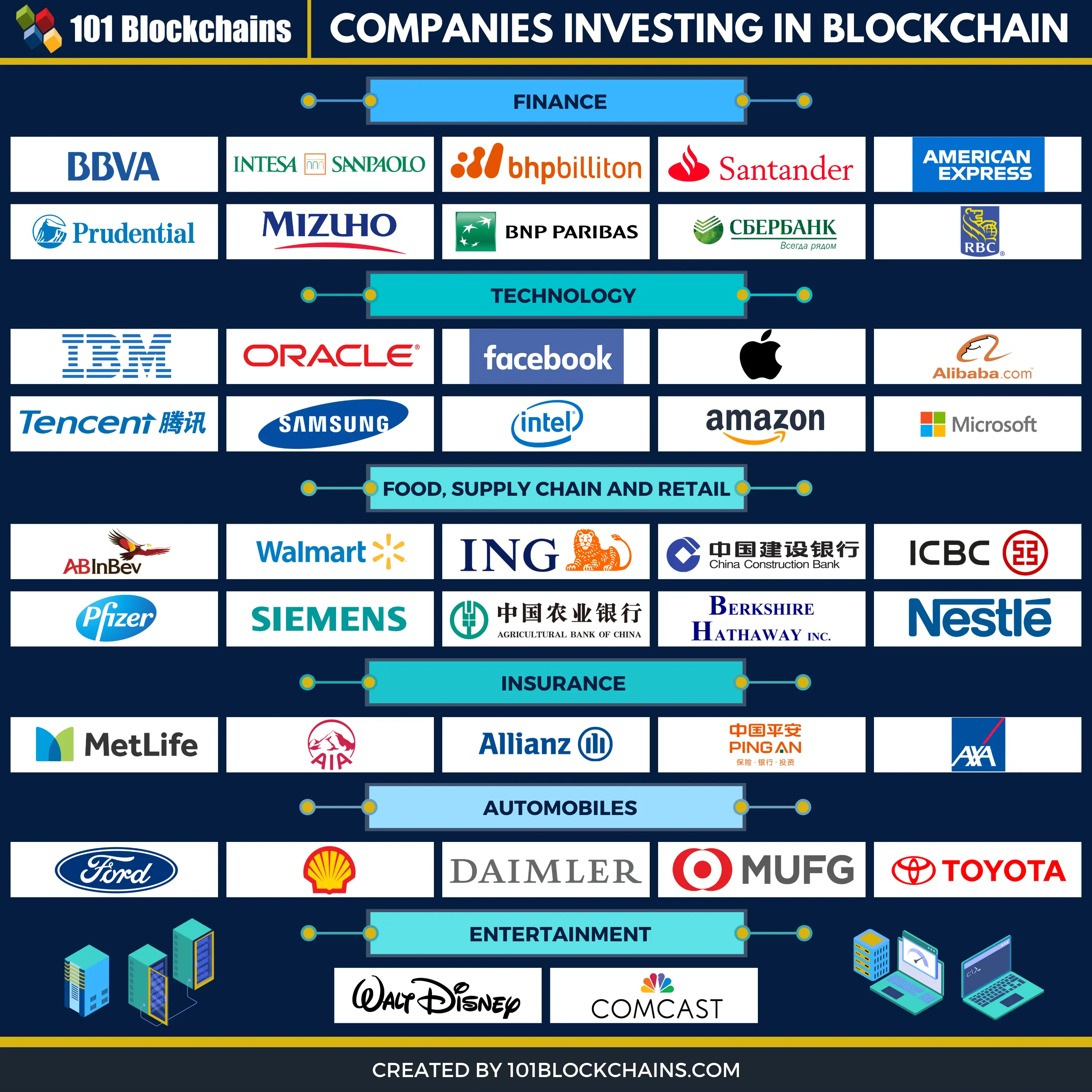
There are also companies that are investing in blockchain. These companies’ motive is to advance blockchain technology by either building the tools, libraries and frameworks. Then, we have companies that invest in startups to help them reach their goal in return for profits.
Start learning Blockchain with World’s first Blockchain Career Paths with quality resources tailored by industry experts Now!
Conclusion
This leads us to the end of our 20+ uses for blockchain technology that you should know. As you can see, we covered almost every aspect of the use-case out there including business, enterprise, governments, and so on.
*Disclaimer: The article should not be taken as, and is not intended to provide any investment advice. Claims made in this article do not constitute investment advice and should not be taken as such. 101 Blockchains shall not be responsible for any loss sustained by any person who relies on this article. Do your own research!

